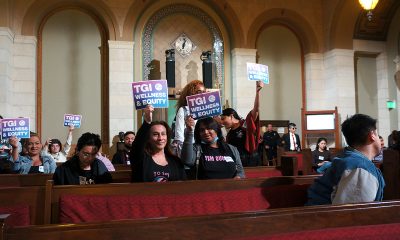National
Soaring hits and dramatic misses at the HRC/CNN LGBTQ Town Hall


Living history. That’s what it felt like inside The Novo theatre at the HRC/CNN LGBTQ Town Hall last Thursday night as nine Democratic presidential candidates showcased their commitment to LGBTQ issues and their plans to advance full equality and end the scourge of AIDS and conversion therapy. Gay presidential candidate Pete Buttigieg and gay CNN moderator Anderson Cooper were well aware they were living history on stage, but, to borrow from The Shirelles, will they all still love LGBTQs tomorrow?
The CNN stage Tuesday night is crowded with 12 Democrats who aspire to topple Donald Trump and live in the White House. The moderators are asking about impeachment, the new Trump-caused war in Northern Syria, immigration, climate change and gun violence.
Sen. Bernie Sanders has returned to campaigning after a heart attack and former Vice President Joe Biden and Sen. Elizabeth Warren have readied their flak jackets for all the incoming grenades tossed by candidates hoping to breakout of single digit poll numbers. Out Mayor Pete Buttigieg is hoping to capitalize on all the thumbs-up, while Sen. Kamala Harris, once considered the female Barack Obama shoe-in, is struggling – she seems to know everything but her message.
Ratings for the Democratic Party’s fourth official debate in Westerville, Ohio are expected to be high, given the near certainty of Trump’s impeachment by the House – but there is also a nauseating feeling that Trump could still turn ashes into confetti and win re-election in 2020. Who on that stage can defeat him?
CNN’s production of the LGBTQ town hall, in partnership with the Human Rights Campaign Foundation, reached 1,430,000 viewers during Buttigieg’s third segment at the peak of the four-and a half-hour program. He was preceded by Biden, who brought in 1,336,000 viewers, and followed by Warren with 1,398,000 viewers. The audience started dipping after that with 1,174,000 viewers watching Harris.
“These are pretty good ratings for the town halls. They are not gangbusters like a debate, but they are better than some that CNN has had earlier in the cycle,” Ted Johnson, Washington correspondent for Deadline, tells the Los Angeles Blade. “The network also emphasizes that it has these not for the audiences but to show their commitment to covering the campaign.”
A ratings junkie, Trump offered a little counter programming on Fox TV with a 102-minute rambling, incoherent and racist campaign rally in Minneapolis, Minnesota – the heavily Somali district represented by Trump nemesis, Ilan Omar. And while the Democrats appealed to LGBTQ voters and allies, Trump unleashed a bombastic sideshow that roused his supporters and left others questioning his mental stability, including acting out “a truly terrible imitation of [FBI employees] Peter Strzok and Lisa Page achieving orgasm,” as Esquire described it.
Saturday Night Live devoted their cold open spoof to the HRC/CNN Equality Town, with a cryptic Anderson Cooper should shrug acknowledging “we’ll never do this again.” But it was former HUD Sec. Julián Castro (Lin-Manuel Miranda) who best nailed the subliminal message of the event: “Well, first of all, gracias. As a Democrat, I want to apologize for not being gay, but I promise to do better in the future.”
What is not a joke is that 11,046,000 LGBTQ adults are still officially second class citizens – the result, the town hall helped underscore – of institutionalized and systematic homophobia, biphobia and transphobia. Additionally, since 2016, HRC has identified more than 57 million “Equality Voters” nationwide who “prioritize LGBTQ-inclusive policies, including marriage equality, equitable family law and laws that would prohibit discrimination on the basis of sexual orientation and gender identity,” says HRC.
In 2018, LGBTQ voters counted for 6% of the entire electorate and cast more than 7 million ballots — a turnout of roughly 70%, compared to a turnout of 50% among the general population.
In 2020, the lives and livelihoods of LGBTQ people are at stake. The town hall occurred two days after the Supreme Court heard three job discrimination cases on whether the firing and harassment of an employee based on that worker’s sexual orientation or gender identity qualifies as sex discrimination under Title VII of the Civil Rights Act? According to an Associated Press analysis,“a ruling that says the federal law doesn’t protect workers targeted because they’re gay or transgender could leave millions vulnerable in more than half of U.S. states.”
An analysis released Oct. 9 by the Williams Institute at UCLA School of Law based on a poll conducted with Reuters/Ipsos of candidate preferences found that nearly 9 million LGBT adults are registered to vote, with half registered as Democrats, 15% registered as Republicans and 22% Independents and the remaining respondents picking another party or demurring on identifying one.
And yet, as Marketwatch extrapolated from the Williams Institute report, around 21% of LGBTQ adults are not registered to vote. That means there are roughly two million more LGBTQ adults still to be registered to vote in the 2020 election.
Two million. And that’s not counting those who want to vote but are shut out or dissuaded or uninspired.
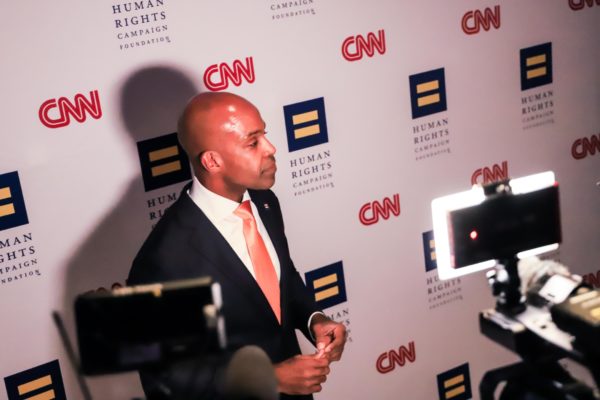
“Voter suppression has primarily targeted voters of color, who also happen to include LGBTQ Americans, who far too often face disproportionate barriers in accessing their right to vote,” HRC President Alphonso David told the Washington Post after HRC backed a voting-rights effort organized by former Georgia gubernatorial candidate Stacey Abrams. Some states, for instance, have voter-ID laws where the person is required to show documentation that matches their birth-assigned gender, which could impede a transgender person from voting. The National Center for Transgender Equality Action Fund has a project to help with that – Transform the Vote that explains #VotingWhileTrans.
One hope was that the HRC/CNN town hall would engage voters, as well as get the candidates on the record about specific LGBTQ issues and introduce non-LGBTQ Americans to the human beings behind those issues. Buttigieg and Warren put out detailed, comprehensive LGBTQ plans and Harris pledge to create a White House advocate for LGBT affairs. Beto O’Rourke put out his LGBT plan last June.
Numerous intersectional issues were addressed such as trans military service, HIV/AIDS, suicide and mental health, youth homelessness, gun violence and education and school safety, as well as civil rights and full equality under the Constitution.
Some new details emerged about some of the candidates. For instance, when CenterLink’s Tanya Tassi asked Harris about the three Title IX employment discrimination cases before the Supreme Court, the California Senator noted that she had joined in a friend of the court brief to “stand in solidarity with all of the folks who are fighting for equality in those three cases.”
And when LA-based HIV-positive dancer and choreographer Thomas Davis asked Harris how she would combat high HIV rates in minority communities, she not only talked about high rates for Black gay men and access to PrEP but shared a personal story about sitting at the bedsides of men who died from AIDS, including Jim Rivaldo, her campaign manager when she ran for San Francisco DA – he was also Harvey Milk’s campaign manager.

“He would always talk about the need to recognize that within the community there are real hierarchies based on race and income and we need to recognize and deal with that,” Harris said. “And since those days to today, we know that in terms of HIV-AIDS rates among black men in particular, it is still much higher because the hierarchy still exists within the community around access to health care, housing, employment, and things of that nature.” She then committed to end HIV/AIDS “within a generation.” (JavonTae Wilson, an HIV counselor and tester for In the Meantime Men, asked a similar question of Sen. Klobuchar).
Contrast that with billionaire Tom Steyer who was asked by Nia-Malika Henderson about living in San Francisco in the 1980s during the height of the AIDS crisis. He noted that no one knew how broad the epidemic would become but research and the response from the community was strong.
“So I look at this as a place where there was something very scary and out of control, that Americans — and don’t forget, President Reagan would never admit to the AIDS crisis or do anything about it,” Steyer said. “But the country responded itself. Researchers responded. People in the community responded. People in churches responded. Actually, there was a great deal of caring that went out. And as devastating as it was in San Francisco, it wasn’t nearly as bad as people were worried about, Nia, and that was really as a result of the work and caring that people put in.”
Henderson didn’t follow up to ask him to clarify what he meant by “it wasn’t nearly as bad as people were worried about.”

In another instance, Anderson Cooper asked Joe Biden what he would do if the Supreme Court ruled that the Civil Rights Act does not protect LGBTQ workers. Biden said he’d pass the Equality Act “right off the bat.” He thinks such protections are constitutional because “I taught constitutional law for 21 years in law school as a constitutional professor, I believe it clearly is covered, clearly is covered.”
Some eyebrows went up. Biden – a constitutional law professor? Actually yes, Jamal Brown, Biden’s National Press Secretary, tells the Los Angeles Blade, except for 17, not 21 years, at Widener University. He points to an Aug. 27, 2008 article reporting that “Biden has been an adjunct law professor at the school for 17 years, co-teaching a class, ‘Special Studies in Constitutional Law.’” One of the proud students watching then-Democratic vice presidential contender Biden speak said: “”I thought it was amazing…,I thought it was very true. He’s a straight guy.”
There were some other confusing moments. In off the record conversations during and after the event, many thought Warren “won” the night, especially after her hysterical take on same sex marriage that caused such an uproar, it distracted from a Buttigieg press availability backstage.
When asked how she would respond to someone saying they believe marriage is between one man and one woman, Warren said: “Well, I’m going to assume it’s a guy who said that. And I’m going to say, ‘just marry one woman.’ I’m cool with that.” She turned, took a comic beat, then added: “Assuming you can find one.”
It was one of the biggest hits of the evening, one that continues to be cited by news outlets reporting on Warren. But there were some dramatic missed opportunities to display cultural competence, too.
For instance, when CNN anchor Chris Cuomo asked Warren about her 2012 comment regarding a judge’s ruling that granted transition-related surgery to a transgender inmate. During her Senate campaign, she said: “I don’t think it’s a good use of taxpayer dollars.”
“Do you regret that?” Cuomo asked.
“Yep. No, it was a bad answer. And I think it was a bad answer. And I believe that everyone is entitled to medical care and medical care that they need, and that includes people who are transgender, who — it is the time for them to have gender-affirming surgery. I just think that’s important and the appropriate medical care,” Warren said.
Though not an explicit apology for her Senate campaign remark, many took it as the equivalent of Harris “taking full responsibility” for her office’s refusal to grant transition healthcare to a trans prisoner when she was DA. But it was the next response that threw people.
“So if you help people get to where they want to be, you also have to protect them as what they are,” Cuomo said. “Do you think that a crime against somebody who is transgender should be charged as a hate crime in statute?”

“You know, I think we could if we think that’s going to be the most effective way to make change. So I’m certainly — I’m open to this,” she said. “But I’ll tell you what I really want. I want a Justice Department that takes this seriously. I want to create a Justice Department that says these crimes matter.
“And when they’re not federal crimes,” Warren continued, “when they are state crimes, in the same way that our Justice Department is empowered to step in if a state is failing to enforce laws and as a result it’s leaving women unprotected, it’s leaving people of color unprotected, the same should happen for LGBTQ people. We need a Justice Department that is on the side of the people, all of the people.”
Did Warren just say she didn’t back a federal hate crime law that included transgender people—with Judy Shepard in the audience? The Los Angeles Blade reached out to her campaign for clarification.
“Gender identity is currently covered by federal hate crime laws and a Warren Administration will use this statute to prosecute,” spokesperson Saloni Sharma told the Los Angeles Blade. “Elizabeth was making the point that hate crimes prosecutions are not a sufficient answer – we need to go further to make addressing this issue a priority for the Department of Justice, attack the roots of the crisis, and prevent violence. She has also co-sponsored the NO HATE Act to strengthen hate crime reporting as one of the ways to do that.”
What viewers did not know was the backstage drama that happened before the event. Roughly a half hour before showtime, CNN pulled a scheduled question from LA-based trans personality Ashlee Marie Preston. Though Preston described the withdrawn invitation to Out Magazine as being “an act of erasure,” a reliable source with knowledge of the incident told the Los Angeles Blade that the question was pulled because Preston was supposed to ask it of Warren but had not disclosed to CNN that she was a paid campaign surrogate, which made her a “plant” questioner and therefore, an ethical conflict of interest to the news production.
CNN only learned about Preston’s financial association with the campaign after a video in which she appeared was posted by Team Warren on Twitter. CNN later learned of the racist and homophobic tweets Preston posted over the years, for which she has somewhat apologized.
Warren’s campaign did not respond to a request for comment about Preston’s tweets.
But Preston’s absence was part of a felt vacuum for trans representation, especially the need to elevate Black trans women of color who, with 19 or 20 murders in 2019, are experiencing an epidemic of violence and hatred, about which HRC is well aware.
There were a number of trans people who were able to briefly share their stories through the questions they asked.

The very first question of the night was for Sen. Cory Booker from Rachel Gonzalez, mother of a 9-year old trans daughter from Dallas and a member of the Human Rights Campaign Parents for Transgender Equality Council. Jacob Lemay, an elementary school student from Massachusetts who identified as “a 9-year-old transgender American, asked Warren a question about school safety. And Gavin Grimm, now 20, told Booker how he sued his high school in 2015 to use the boy’s restroom – a case that went on a legal roller coaster for four years until he finally won on Aug. 9, 2019.
Also representing the trans community were U.S. Air Force combat vet Shannon Scott; Khloe Perez-Rios, a community organizer from Rancho Cucamonga who works at Bienestar; Mariana Marroquin, program manager for the LA-based Trans Wellness Center; and fabulous Black trans singer/songwriter Shea Diamond (who made sure Nia-Malika Henderson pronounced her name correctly); and Black trans activist Carter Brown who was fired from his job in Texas. Andrea Jenkins, the first trans member of the Minneapolis City Council, was Klobuchar’s guest and HRC National Press Sec. Sarah McBride, a candidate for Delaware State Senate, got a shout out from Biden.
But despite the diversity among the questioners and the respectful understanding that one of these Democrats could become the next President of the United States, there was a painful sense of the lack of urgency to the ongoing crisis of the murder and violence toward Black and Brown trans women.
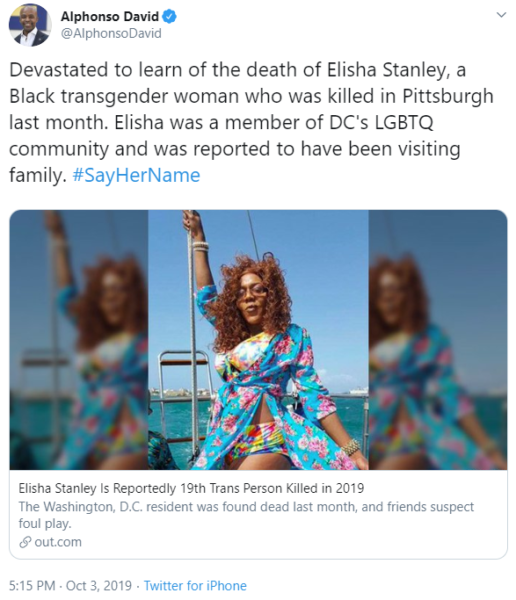
TransLatin@ Coalition founder Bamby Salcedo, along with Maria Roman-Taylorson, and and Michaé Pulido decided to do something about it, chanting and waving a trans flag with the message about trans murders, disrupting Buttigieg’s segment of the HRC/CNN Equality Town Hall.
“The reason we decided to do it when Pete Buttigieg was onstage is because he is a member of the LGBT community and we wanted for him to see first-hand the violence where at least 20 trans women have been killed,” Salcedo told the Los Angeles Blade.
“We needed to show him the importance of addressing the violence against trans women as a priority and to really make sure he understands what needs to happen in order for us to have better life within our broader LGBT community and the broader society,” she said. “We wanted the national mainstream audience to get the broader message.”
Salcedo also noted how roughly they were treated by security. “The way security handled us was inappropriate, even violent, simply because we were trans women,” Salcedo said. “Honestly, I think law enforcement has the mentality to be rough toward trans women, period. That has to change.”

Anderson Cooper was a little thrown but remained calm.
“People are dying,” the TransLatin@ Coalition protesters yelled.
“It’s OK. It’s OK. Be cool. It’s OK. It’s OK. Hey, hey, hey, hey, guys, guys, guys,” Cooper said to the trans women. “Yo, guys, chill out. Guys, relax, relax.”
Cooper then tried to explain the disruption to the million-plus viewers.
“Let me just point out there is a long and proud tradition and history in the gay, lesbian, and transgender community of protest, and we applaud them for their protest,” he said to applause. “And they are absolutely right to be angry and upset at the lack of attention, particularly in the media, on the lives of transgendered….”

After the protesters were led away, Buttigieg got his question.
“And before turning to it, I do want to acknowledge what these demonstrators were speaking about, which is the epidemic of violence against black trans women in this country right now.
(APPLAUSE)
“And I believe or would like to believe that everybody here is committed to ending that epidemic, and that does include lifting up its visibility and speaking to it.
(APPLAUSE)
It’s also a reminder of something at stake in your question, which is just how much diversity there is within the LGBTQ+ community. And I’m very mindful of the fact that my experience as a gay man, but as a white, cisgender gay man, means that there are dimensions, for example, of what it’s like to be a black trans woman that I do not personally understand.
But I also think the diversity within the LGBTQ+ community is part of what we have to offer right now. Our community, our country is so torn apart, we’re so fragmented, and here we have the LGBTQ+ world that is everywhere. We are in every state, every community. Whether folks realize it or not, we’re in every family. And that means we can also have the power to build bridges.
And when somebody’s weighing whether to come out or just coming to terms with who they are, it’s really important for them to know that they’re going to be accepted. There is no right or wrong way to be gay, to be queer, to be trans. And I hope that our own community, even as we struggle to define what our identity means, defines it in a way that lets everybody know that they belong among us.”
After Salcedo was taken away and the televised questioning resumed, it was up to Blossom C. Brown to raise the stakes again.
Lizette Trujillo, from Tucson, Arizona, was about to ask about her transgender son when she suddenly stopped. “I just want to take a moment before I ask my question to validate the pain of our transgender siblings that demonstrated earlier and that have spoken up today, especially black trans women, she said.
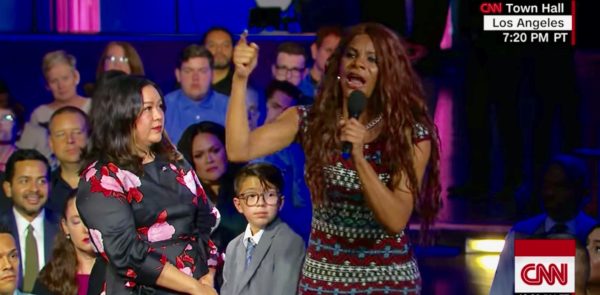
Then came Blossom C. Brown, who swiped Trujillo’s microphone. Here’s how the exchange unfolded:
“I don’t want to take this away from you but let me tell you something – Black trans women are being killed in this country. And CNN, you have erased black trans women for the last time. Let me tell you something. Black trans women are dying. Our lives matter.
I am an extraordinary Black trans woman, and I deserve to be here. My Black trans sisters that are here. I am tired. I am so tired of just sitting there. And it’s not just my Black trans women…
LEMON: Ma’am. Ma’am.
BROWN: It’s my Black trans brothers, too. And I will say what I’m going to say. I’m going to say what I’m going to say.
LEMON: No, no, no, just come here. No, I just want to ask you something. Come here. Tell me. I want you to talk — what’s your name?
BROWN: Blossom C. Brown.
LEMON: Blossom, let me ask…
BROWN: Google me. Please Google me.
LEMON: Blossom, thank you. Let me tell you something. No, don’t come on the stage. And can I — may I have the mic?
BROWN: OK.
LEMON: May I have the mic? Blossom, let me tell you something. The reason that we’re here is to validate people like you. That is why we’re giving — but that is why we’re here.
BROWN: (OFF-MIKE) your actions do not say that.
LEMON: OK, but…
BROWN: Not one black trans woman has taken the mic tonight. Not one black trans man has taken the mic tonight.
LEMON: Yeah. Yeah. Hang on. We can’t hear you. Blossom, we can’t hear you. Here. Blossom, we can’t hear you.
BROWN: Baby, your actions have to speak louder than words. Because guess what? Not one Black trans woman has taken the mic tonight. Not one Black trans man has taken the mic tonight. Show me.
LEMON: Blossom, Blossom…
BROWN: (OFF-MIKE)
LEMON: OK, thank you, I appreciate it. Blossom, you’re a Black trans woman. You have the mic in your hand. I’ve given — I’ve taken it and given it back to you. We want to hear from you. We have had trans people of color. We have all people here. And you’re welcome — but we — but we are proud and happy that you’re here. We’re proud and happy that you’re here. Yes, but, remember, we’re under a time constraint. All right. Thank you, Blossom, and I appreciate it.
BROWN: Yeah, that’s how anti-Blackness works, amongst people of color. That’s what anti-Blackness looks like, the erasure of Black trans people.
LEMON: All right.
BROWN: I’m here. We are here in this room. Please give us that opportunity.
LEMON: Blossom, thank you so much. And we appreciate it. Thank you very much. Yes, no, I got it. There we go.
(APPLAUSE)
Congressman, please address that. Do you want to address that?
O’ROURKE: I’d be happy to. Yeah.
LEMON: Thank you, Blossom.
BROWN: I just want to remind everyone that Stonewall was led by transgender women of color, and it’s 15 years later, and we’re still failing you as a community. But there are mothers like me and other community members that are committed to change. And so thank you for allowing that.
LEMON: Thank you.
(APPLAUSE)

O’Rourke commended Don Lemon: “And then I want to commend you, because after Blossom took the microphone from you, and then returned it after what she said, you acknowledged that she did not grab the mic to speak out against anybody, or to put down anybody. She grabbed the mic to stand up for herself and other trans women of color and trans men of color that she talked about, as well. That’s what democracy looks like in America.”
Brown later told the Los Angeles Blade that she is hoping to organize a forum specifically tackling the issues of significance to Black trans women. (Go to her Facebook page to watch for developments)
HRC President Alphonso David later tweeted an apology:
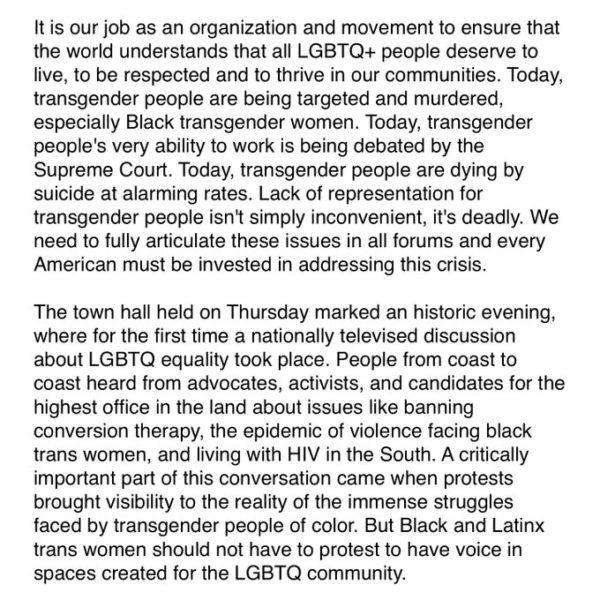
What has not been addressed is the lack of attention to lesbian, bisexual and non-binary people.
Lesbian pioneer Karla Jay, PhD, Professor Emerita of English and Women’s & Gender Studies at Pace University in New York, wrote an op-ed for the Los Angeles Blade in which she laments the missing lesbians.
“When the CNN/HRC (Human Rights Campaign) televised LGBT Town Hall ended at midnight on the East Coast, I felt more like I had survived an entire Jerry Lewis Telethon for Muscular Dystrophy (OK, this dates me) rather than an informative interchange between Democratic candidates and a lively audience. When I unscientifically polled “Friends” on Facebook afterwards, not one of perhaps 700 lesbians admitted to having watched the event. My bluest of the blue lesbian friends visiting from Florida confessed that they had fallen asleep not far in,” she wrote. “But it wasn’t Lesbian Nation’s fault for conking out at the remote when HRC’s questions totally ignored us.”
Yes, towards the ends, in one question “asking about medical coverage for her spouse, one woman referred to herself and her wife, and there was one bisexual and one nonbinary person,” she wrote. “For some reason, the general public and even many gay men seem to think that lesbians have no specific issues except to worry about which half of a couple will get custody of the cat after a divorce, who will win the lesbian softball tournament, and what should be brought to the vegan potluck. However, not being seen is not the same as being well off or content.”
Like straight women lesbians tend to live into old age and become victims of elder abuse, denial of services, forced to separate from a partner when seeking assisted living or at a homeless shelter. And what about reproductive health and creating a family by having “access to alternative insemination in every state, and justice for both biological and nonbiological parents in the event of a separation or divorce.
According to The Washington Post, “there are 5.5 million lesbians in the United States—most of them presumably of voting age. The robust lesbian communities in Michigan, Wisconsin, and Pennsylvania could turn those states blue,” Jay writes. “Reaching out to lesbians is an uncomplicated strategy that could pay big dividends. But suggesting by omission that our lives don’t matter is a strategic error.”

Non-binary people got really short-changed. Oscar Buckland, an LA-based community college student who identifies as non-binary asked Amy Klobuchar: “In California, I am able to change my gender to X. However, on the federal level, there is no such option. Will you recognize third gender markers on a federal level?
“Yes. Thank you. I will,” she said. “And I think there’s also — you know, I think that there is a lot of work we need to do, all over the country, with driver’s licenses, as you know. Not every state has some of the provisions that California have in place and just work on a state-by-state basis to make those changes. So, thanks for asking the question.”

Bisexuals also received scant notice. Julian Castro said bisexuals would be included in his administration’s LGBTQ policies.
Actor/activist Sara Ramirez fumed on Twitter.
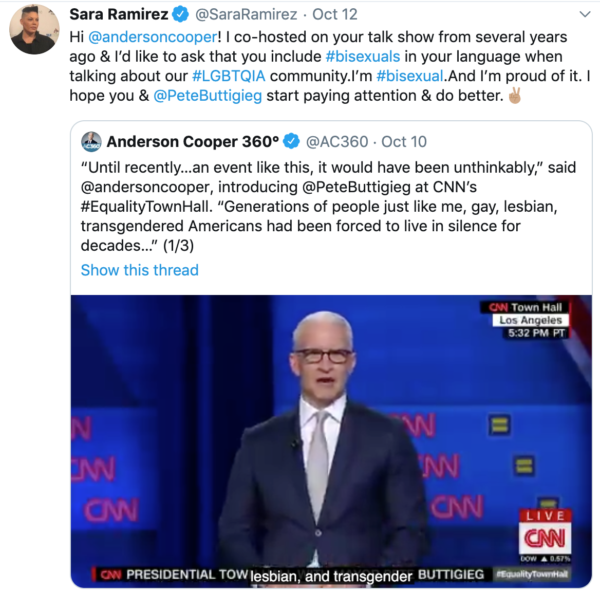
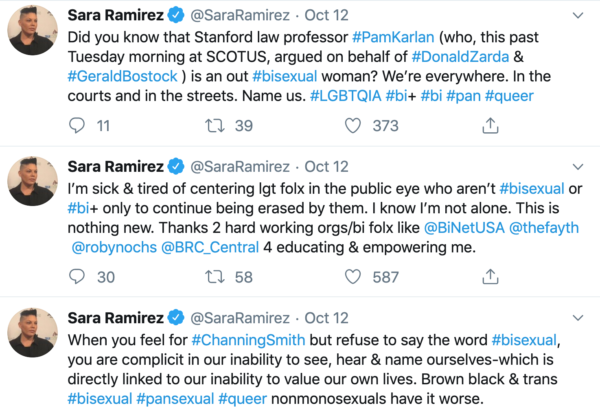
But the LGBTQ civil rights movement, which claims to seek social and economic justice, barely notices that there are more bisexuals than gay men, lesbians and trans people, according to the Williams Institute, and bisexuals are also at huge risk for poverty.
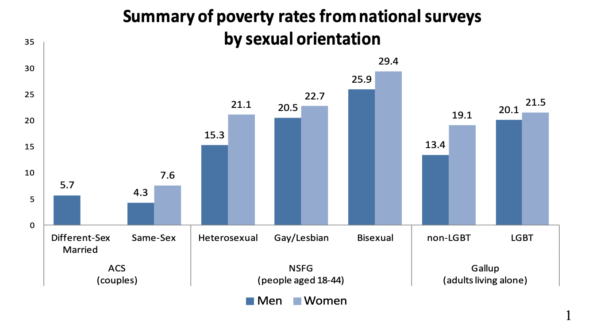
It is incumbent upon the LGBTQ community itself to raise and help solve these issues – including finding those 2 million LGBTQ unregistered voters and educating them about the historical significance of the 2020 elections.
See HRC highlights here. See CNN Live blog highlights here. Find CNN transcripts of all the town halls here.
All photos, except screen grabs, are by Daniel Sliwa for the Los Angeles Blade.
National
LGBTQ+ activists mourn the Rev. Jesse Jackson
Prominent civil rights leader died on Tuesday at 84

LGBTQ+ rights advocates have joined the nation’s civil rights leaders in reflecting on the life and work of the Rev. Jesse Jackson, the famed U.S. civil rights leader whose family announced passed away on Feb. 17 at the age of 84.
Known as a follower and associate of African American civil rights leader Dr. Martin Luther King Jr., Jackson emerged in the 1960s as a leading civil rights advocate for the Black community and other minorities for decades throughout the U.S., including in Washington.
In a less known aspect of Jackson’s involvement in politics, following his campaigns for U.S. president in 1984 and 1988, Jackson won election in 1990 as the District of Columbia’s shadow senator, a ceremonial position created to lobby Congress for D.C. statehood.
Jackson, who at that time had a home in D.C., received strong support from D.C. voters, including LGBTQ+ voters who became aware of Jackson’s support for LGBTQ+ issues. He served just one six-year term as the city’s shadow senator before choosing not to run again.
An early supporter of marriage equality, Jackson was among the prominent speakers at the 1987 National March on Washington for Lesbian and Gay Rights. Jackson joined other speakers at a rally on the grounds of the U.S. Capitol.
During his run for president in 1988 the D.C. Gertrude Stein Democratic Club, an LGBTQ+ group that has since been renamed the Capital Stonewall Democrats, endorsed Jackson for president ahead of the city’s Democratic presidential primary.
“The fight for justice requires courage, hope, and a relentlessness that will not be denied. Rev. Jesse Jackson embodied that fight every day,” said Kelley Robinson, president of the Human Rights Campaign, the nation’s largest LGBTQ+ advocacy organization.
“From disrupting political systems and building people power to helping this country imagine a freer future for all of us, Rev. Jackson was a force,” Robinson said in a statement. “His historic presidential campaigns paved the way for generations of Black leaders to imagine ourselves in rooms we were once told were closed to us.”
Robinson added, “Reverand Jackson also stood up when it mattered; when it wasn’t easy and when it wasn’t popular. His support for marriage equality and for LGBTQ+ people affirmed a simple, powerful truth: our liberation is bound together.”
She also pointed to Jackson’s support for efforts to repeal California’s Proposition 8, a 2008 referendum passed by voters to ban same-sex marriage in the state.
“Marriage is based on love and commitment, not on sexual orientation. I support the right for any person to marry the person of their choosing,” Robinson quoted Jackson as saying in support of efforts that succeeded in overturning the California marriage ban.
The national organization PFLAG, which represents parents, friends, and allies of the LGBTQ+ community, released a statement from its president, Brian K. Bond, citing Jackson’s longstanding support for the LGBTQ+ community.
“Today, as we learn of the passing of Rev. Jesse Jackson, we mourn the loss of a giant among us,” Bond said in the statement. “When many refused to acknowledge the existence and struggles of LGBTQ+ people, Rev. Jackson saw us, affirmed us, and demanded equality inclusively,” Bond said. “In his address to the Democratic National Convention in 1984, Rev. Jackson named us specifically as part of the fabric of the American Quilt,” Bond says in his statement.
The statement adds, “He has shown up for and marched with the LGBTQ+ movement through the AIDS crisis, marriage equality, and ever after. Rev. Jackson’s leadership and allyship for LGBTQ+ people will be felt profoundly by his PFLAG family. We will continue to honor his legacy as we continue to strive to achieve justice and equality for all.”
D.C. Mayor Muriel Bowser, citing Jackson’s role as a D.C. shadow senator, said for many in the country, Jackson “was the first person they heard make the case for D.C. statehood. The first person they heard say: it’s the right thing to do.”
Bowser added, “In 1988, he said that we were at a crossroads, and he posed this question: Shall we expand, be inclusive, find unity and power; or suffer division and impotence? It is a question as relevant today as when he asked it,” the mayor said, “And in Rev. Jackson’s name and memory, we must continue fighting for the answer we know our nation deserves.”
D.C. Congressional Delegate Eleanor Holmes Norton (D) said she was honored to have worked with Jackson during his tenure as D.C. shadow senator and throughout his years as a civil rights advocate.
“From the front lines of the civil rights movement to national campaigns that expanded the political imagination of this country, Jesse Jackson lifted up the voices of those too often unheard,” Norton said in a statement. “He turned protest into progress and transformed moral conviction into political action”
According to Norton, “His work-built bridges across race, class, and geography, helping redefine what inclusive democracy could look like in America.”
New York
Pride flag removed from Stonewall Monument as Trump targets LGBTQ landmarks
The new NPS policy targets Pride flags amid consistent efforts from the Trump administration to minimize LGBTQ history

A rainbow Pride flag flying at the Stonewall National Monument in New York was removed at the direction of Trump administration officials at the National Park Service, according to a source familiar with the matter who spoke to the Blade on condition of anonymity.
The source said the move had been in the works for weeks and is part of ongoing efforts by the Trump-Vance administration to erase LGBTQ identity from federally controlled landmarks.
In response to the Blade’s request for information about the new flag policy, the National Park Service provided the following statement:
“Current Department of the Interior policy provides that the National Park Service may only fly the U.S. flag, Department of the Interior flags, and the Prisoner of War/Missing in Action flag on flagpoles and public display points. The policy allows limited exceptions, permitting non-agency flags when they serve an official purpose. These include historical context or reenactments, current military branch flags, flags of federally recognized tribal nations affiliated with a park, flags at sites co-managed with other federal, state, or municipal partners, flags required for international park designations, and flags displayed under agreements with U.S. Citizenship and Immigration Services for Naturalization ceremonies.”
The statement also included official guidance on the display of non-agency flags issued by Trump-appointed National Park Service Director Jessica Bowron.
The Blade reached out to other organizations to confirm the status of the Pride flag last week, including the Stonewall National Monument Visitor Center, the NYC Landmarks Preservation Commission, and the National Parks Conservation Association. None were able to provide details about whether the flag was still flying at that time but it has since been removed.
This action aligns with other moves targeting and erasing LGBTQ history. In September, the Blade reported that three organizations originally slated to receive more than $1.25 million from the National Park Service’s Underrepresented Communities Grant Program would no longer receive funding: In Washington, D.C., the Preservation League had been awarded $75,000 to document LGBTQ+ historic resources. In Providence, R.I., the Preservation Society was slated for $74,692 to conduct an LGBTQ+ survey and prepare a National Register nomination. And in New York, the Fund for the City of New York, Inc., had been awarded $32,000 to nominate the residence of Bayard Rustin — the iconic civil rights and LGBTQ activist — as a National Historic Landmark.
Florida
Disney’s Gay Days ‘has not been canceled’ despite political challenges
GayDays is moving forward with its planned LGBTQ meet-up

Gay Days in Orlando is preparing for its 2026 gathering though organizers have yet to release full details.
Concerns emerged about the status of the annual meetup of LGBTQ people at Walt Disney World in Orlando, Fla., after social media posts and multiple news outlets reported the event would not take place this year.
In response to inquiries from the Blade, Josh Duke, co-owner of Gay Days, clarified that an update would come this week.
“At this time, I’d like to clarify that Gay Days Orlando has not been canceled,” an email to the Blade said. “We are currently finalizing details regarding our plans for 2026 and will be making an official announcement later this week.”
Earlier this week, Gay Days posted about a pause in their plans for the annual meeting, which quickly gained traction online.
In an official statement on social media, Gay Days organizers cited several factors behind what had initially appeared to be a cancellation of their 2026 event.
“Changes to our host hotel agreement, the loss of key sponsorship support, and broader challenges currently impacting LGBTQIA+ events nationwide made it impossible to deliver the experience our community deserves,” organizers wrote. However, the statement added, “This is a pause — not an ending.”
In a longer message shared with supporters, organizers elaborated on that now-reversed decision.
“Gay Days Family — it is with very heavy hearts that we share Gay Days 2026 will not take place this year. This was an incredibly difficult decision and one that was only made after every possible option was explored.
“Gay Days has always been more than an event — it is community, family, and a place where so many memories are made. While this pause is painful, it also gives us the opportunity to step back, listen, and begin shaping a stronger and reimagined GayDays for the future. Thank you for your continued love, patience, and support. This is not goodbye — it’s a reset, and we look forward to creating the future of GayDays together.”
GayDays, which began in 1991, encourages queer Disney fans to visit the Orlando theme park while wearing red shirts to identify one another. Originally focused on gay men reclaiming the childhood joy often denied due to homophobia, the event has expanded over the years to include LGBTQ+ families on summer vacations and queer couples honeymooning in the Magic Kingdom.
Disney made history in 2019 by holding its first-ever official Pride event at its European park, Disneyland Paris. In 2023, Disneyland California hosted the first U.S. official Pride event.
Concerns about the potential cancellation had arisen amid broader challenges affecting LGBTQ events nationwide. These include changes in hotel agreements, sponsorship support, and Florida’s increasingly restrictive anti-LGBTQ policies under Gov. Ron DeSantis. Florida currently has an equality score of -3.00 out of 49 from the Movement Advancement Project, which evaluates states based on policies affecting relationship and parental recognition, nondiscrimination, religious exemptions, LGBTQ youth, healthcare, criminal justice, and transgender identity documentation.
Recent legislation in Florida has included prohibitions on hormone replacement therapy for transgender minors, restrictions on adult access to treatment, bans on drag performances for those under 18, bathroom bans for transgender people in state buildings, and expansion of the Parental Rights in Education Act, commonly called the “Don’t Say Gay” law. These measures limit public school instruction or discussion about sexual orientation and gender identity.
Gay Days Anaheim is scheduled to take place at Disneyland Resort in September.
Disney has also maintained a focus on Pride, reporting in 2022 that proceeds from Pride merchandise benefited numerous LGBTQ organizations, including GLSEN, PFLAG, The Trevor Project, Zebra Coalition, the Los Angeles LGBT Center, the LGBT Center Orange County, the San Francisco LGBT Center, and the Ali Forney Center. Pride merchandise sold internationally supports local LGBTQ organizations in those regions.
More details about this event are expected to be released on Friday.
Puerto Rico
Bad Bunny shares Super Bowl stage with Ricky Martin, Lady Gaga
Puerto Rican activist celebrates half time show

Bad Bunny on Sunday shared the stage with Ricky Martin and Lady Gaga at the Super Bowl halftime show in Santa Clara, Calif.
Martin came out as gay in 2010. Gaga, who headlined the 2017 Super Bowl halftime show, is bisexual. Bad Bunny has championed LGBTQ+ rights in his native Puerto Rico and elsewhere.
“Not only was a sophisticated political statement, but it was a celebration of who we are as Puerto Ricans,” Pedro Julio Serrano, president of the LGBTQ+ Federation of Puerto Rico, told the Washington Blade on Monday. “That includes us as LGBTQ+ people by including a ground-breaking superstar and legend, Ricky Martin singing an anti-colonial anthem and showcasing Young Miko, an up-and-coming star at La Casita. And, of course, having queer icon Lady Gaga sing salsa was the cherry on the top.”
La Casita is a house that Bad Bunny included in his residency in San Juan, the Puerto Rican capital, last year. He recreated it during the halftime show.
“His performance brought us together as Puerto Ricans, as Latin Americans, as Americans (from the Americas) and as human beings,” said Serrano. “He embraced his own words by showcasing, through his performance, that the ‘only thing more powerful than hate is love.’”
U.S. Supreme Court
Competing rallies draw hundreds to Supreme Court
Activists, politicians gather during oral arguments over trans youth participation in sports

Hundreds of supporters and opponents of trans rights gathered outside of the United States Supreme Court during oral arguments for Little v. Hecox and West Virginia v. B.P.J. on Tuesday. Two competing rallies were held next to each other, with politicians and opposing movement leaders at each.
“Trans rights are human rights!” proclaimed U.S. Sen. Ed Markey (D-Mass.) to the crowd of LGBTQ rights supporters. “I am here today because trans kids deserve more than to be debated on cable news. They deserve joy. They deserve support. They deserve to grow up knowing that their country has their back.”

“And I am here today because we have been down this hateful road before,” Markey continued. “We have seen time and time again what happens when the courts are asked to uphold discrimination. History eventually corrects those mistakes, but only after the real harm is done to human beings.”
View on Threads
U.S. Education Secretary Linda McMahon spoke at the other podium set up a few feet away surrounded by signs, “Two Sexes. One Truth.” and “Reality Matters. Biology Matters.”
“In just four years, the Biden administration reversed decades of progress,” said McMahon. “twisting the law to urge that sex is not defined by objective biological reality, but by subjective notion of gender identity. We’ve seen the consequences of the Biden administration’s advocacy of transgender agendas.”

U.S. Rep. Mark Takano (D-Calif.), chair of the Congressional Equality Caucus, was introduced on the opposing podium during McMahon’s remarks.
“This court, whose building that we stand before this morning, did something quite remarkable 6 years ago.” Takano said. “It did the humanely decent thing, and legally correct thing. In the Bostock decision, the Supreme Court said that trans employees exist. It said that trans employees matter. It said that Title VII of the Civil Rights Act protects employees from discrimination based on sex, and that discrimination based on sex includes discrimination based on gender identity and sexual orientation. It recognizes that trans people have workplace rights and that their livelihoods cannot be denied to them, because of who they are as trans people.”
“Today, we ask this court to be consistent,” Takano continued. “If trans employees exist, surely trans teenagers exist. If trans teenagers exist, surely trans children exist. If trans employees have a right not to be discriminated against in the workplace, trans kids have a right to a free and equal education in school.”
Takano then turned and pointed his finger toward McMahon.
“Did you hear that, Secretary McMahon?” Takano addressed McMahon. “Trans kids have a right to a free and equal education! Restore the Office of Civil Rights! Did you hear me Secretary McMahon? You will not speak louder or speak over me or over these people.”
Both politicians continued their remarks from opposing podiums.
“I end with a message to trans youth who need to know that there are adults who reject the political weaponization of hate and bigotry,” Takano said. “To you, I say: you matter. You are not alone. Discrimination has no place in our schools. It has no place in our laws, and it has no place in America.”
U.S. Supreme Court
Supreme Court hears arguments in two critical cases on trans sports bans
Justices considered whether laws unconstitutional under Title IX

The Supreme Court heard two cases today that could change how the Equal Protection Clause and Title IX are enforced.
The cases, Little v. Hecox and West Virginia v. B.P.J., ask the court to determine whether state laws blocking transgender girls from participating on girls’ teams at publicly funded schools violates the 14th Amendment’s Equal Protection Clause and Title IX. Once decided, the rulings could reshape how laws addressing sex discrimination are interpreted nationwide.
Chief Justice John Roberts raised questions about whether Bostock v. Clayton County — the landmark case holding that Title VII of the Civil Rights Act of 1964 protects employees from discrimination based on sexual orientation or gender identity — applies in the context of athletics. He questioned whether transgender girls should be considered girls under the law, noting that they were assigned male at birth.
“I think the basic focus of the discussion up until now, which is, as I see it anyway, whether or not we should view your position as a challenge to the distinction between boys and girls on the basis of sex or whether or not you are perfectly comfortable with the distinction between boys and girls, you just want an exception to the biological definition of girls.”
“How we approach the situation of looking at it not as boys versus girls but whether or not there should be an exception with respect to the definition of girls,” Roberts added, suggesting the implications could extend beyond athletics. “That would — if we adopted that, that would have to apply across the board and not simply to the area of athletics.”
Justice Clarence Thomas echoed Roberts’ concerns, questioning how sex-based classifications function under Title IX and what would happen if Idaho’s ban were struck down.
“Does a — the justification for a classification as you have in Title IX, male/female sports, let’s take, for example, an individual male who is not a good athlete, say, a lousy tennis player, and does not make the women’s — and wants to try out for the women’s tennis team, and he said there is no way I’m better than the women’s tennis players. How is that different from what you’re being required to do here?”
Justice Samuel Alito addressed what many in the courtroom seemed reluctant to state directly: the legal definition of sex.
“Under Title IX, what does the term ‘sex’ mean?” Alito asked Principal Deputy Solicitor General Hashim Mooppan, who was arguing in support of Idaho’s law. Mooppan maintained that sex should be defined at birth.
“We think it’s properly interpreted pursuant to its ordinary traditional definition of biological sex and think probably given the time it was enacted, reproductive biology is probably the best way of understanding that,” Mooppan said.
Justice Sonia Sotomayor pushed back, questioning how that definition did not amount to sex discrimination against Lindsay Hecox under Idaho law. If Hecox’s sex is legally defined as male, Sotomayor argued, the exclusion still creates discrimination.
“It’s still an exception,” Sotomayor said. “It’s a subclass of people who are covered by the law and others are not.”
Justice Elena Kagan highlighted the broader implications of the cases, asking whether a ruling for the states would impose a single definition of sex on the 23 states that currently have different laws and standards. The parties acknowledged that scientific research does not yet offer a clear consensus on sex.
“I think the one thing we definitely want to have is complete findings. So that’s why we really were urging to have a full record developed before there were a final judgment of scientific uncertainty,” said Kathleen Harnett, Hecox’s legal representative. “Maybe on a later record, that would come out differently — but I don’t think that — ”

“Just play it out a little bit, if there were scientific uncertainty,” Kagan responded.
Justice Brett Kavanaugh focused on the impact such policies could have on cisgender girls, arguing that allowing transgender girls to compete could undermine Title IX’s original purpose.
“For the individual girl who does not make the team or doesn’t get on the stand for the medal or doesn’t make all league, there’s a — there’s a harm there,” Kavanaugh said. “I think we can’t sweep that aside.”
Justice Amy Coney Barrett questioned whether Idaho’s law discriminated based on transgender status or sex.
“Since trans boys can play on boys’ teams, how would we say this discriminates on the basis of transgender status when its effect really only runs towards trans girls and not trans boys?”
Harnett responded, “I think that might be relevant to a, for example, animus point, right, that we’re not a complete exclusion of transgender people. There was an exclusion of transgender women.”
Justice Ketanji Brown Jackson challenged the notion that explicitly excluding transgender people was not discrimination.
“I guess I’m struggling to understand how you can say that this law doesn’t discriminate on the basis of transgender status. The law expressly aims to ensure that transgender women can’t play on women’s sports teams… it treats transgender women different than — than cis-women, doesn’t it?”
Idaho Solicitor General Alan Hurst urged the court to uphold his state’s ban, arguing that allowing participation based on gender identity — regardless of medical intervention — would deny opportunities to girls protected under federal law.
Hurst emphasized that biological “sex is what matters in sports,” not gender identity, citing scientific evidence that people assigned male at birth are predisposed to athletic advantages.
Joshua Block, representing B.P.J., was asked whether a ruling in their favor would redefine sex under federal law.
“I don’t think the purpose of Title IX is to have an accurate definition of sex,” Block said. “I think the purpose is to make sure sex isn’t being used to deny opportunities.”
Becky Pepper-Jackson, identified as plaintiff B.P.J., the 15-year-old also spoke out.
“I play for my school for the same reason other kids on my track team do — to make friends, have fun, and challenge myself through practice and teamwork,” said Pepper-Jackson. “And all I’ve ever wanted was the same opportunities as my peers. But in 2021, politicians in my state passed a law banning me — the only transgender student athlete in the entire state — from playing as who I really am. This is unfair to me and every transgender kid who just wants the freedom to be themselves.”

Outside the court, advocates echoed those concerns as the justices deliberated.
“Becky simply wants to be with her teammates on the track and field team, to experience the camaraderie and many documented benefits of participating in team sports,” said Sasha Buchert, counsel and Nonbinary & Transgender Rights Project director at Lambda Legal. “It has been amply proven that participating in team sports equips youth with a myriad of skills — in leadership, teamwork, confidence, and health. On the other hand, denying a student the ability to participate is not only discriminatory but harmful to a student’s self-esteem, sending a message that they are not good enough and deserve to be excluded. That is the argument we made today and that we hope resonated with the justices of the Supreme Court.”
“This case is about the ability of transgender youth like Becky to participate in our schools and communities,” said Joshua Block, senior counsel for the ACLU’s LGBTQ & HIV Project. “School athletics are fundamentally educational programs, but West Virginia’s law completely excluded Becky from her school’s entire athletic program even when there is no connection to alleged concerns about fairness or safety. As the lower court recognized, forcing Becky to either give up sports or play on the boys’ team — in contradiction of who she is at school, at home, and across her life — is really no choice at all. We are glad to stand with her and her family to defend her rights, and the rights of every young person, to be included as a member of their school community, at the Supreme Court.”
The Supreme Court is expected to issue rulings in both cases by the end of June.
Minnesota
Reports say woman killed by ICE was part of LGBTQ community
Renee Nicole Good shot in Minneapolis on Wednesday

A U.S. Immigration and Customs Enforcement agent shot and killed a woman in Minneapolis as she attempted to drive away from law enforcement during a protest on Wednesday.
The Star Tribune newspaper identified the victim as Renee Nicole Good, 37, a Minneapolis resident who lived blocks from where she was shot in the Central neighborhood, according to reports. Donna Ganger, Good’s mother, told the Star Tribune that her daughter lived in the Twin Cities with her wife.
Multiple videos of the shooting have gone viral on social media, showing various angles of the fatal incident — including footage that shows Good getting into her car and attempting to drive away from law enforcement officers, who had their weapons drawn.
In the videos, ICE agents can be heard telling Good to “get out of the fucking car” as they attempted to arrest her. Good, who press reports say was married to a woman, ended up crashing her car into an electric pole and other vehicles. She was later transported from the scene of the shooting and died at the hospital.
President Donald Trump defended the ICE agent on Truth Social, saying the officer was “viciously” run over — a claim that coincides with Homeland Security Secretary Kristi Noem’s assessment of the situation. Noem, a South Dakota Republican, insisted the officer “fired defensive shots” at Good after she attempted to run over law enforcement agents “in an attempt to kill them — an act of domestic terrorism.”
Multiple state and local officials disputed claims that the shooting was carried out in self-defense at the same time Noem was making those assertions.
An Instagram account that appears to belong to Good describes her as a “poet and writer and wife and mom and shitty guitar strummer from Colorado; experiencing Minneapolis, MN,” accompanied by a rainbow flag emoji.
A video posted to X after the shooting shows a woman, reportedly her wife, sitting on the ground, crying and saying, “They killed my wife. I don’t know what to do.”
“We’ve dreaded this moment since the early stages of this ICE presence in Minneapolis,” Mayor Jacob Frey said during a Wednesday press conference. “Having seen the video myself, I want to tell everybody directly that [the DHS’s claim of self-defense] is bullshit. This was an agent recklessly using power that resulted in somebody dying, getting killed.”
“I have a message for ICE. To ICE, get the fuck out of Minneapolis,” Frey continued. “We do not want you here. Your stated reason for being in this city is to create some kind of safety, and you are doing exactly the opposite. People are being hurt. Families are being ripped apart. Long-term Minneapolis residents that have contributed so greatly to our city, to our culture, to our economy are being terrorized, and now somebody is dead. That’s on you, and it’s also on you to leave.”
Across the Capitol, members of the House and the Senate condemned the actions of the officer.
“There’s no indication she’s a protester, there’s nothing that at least you can see on the video, and therefore nothing that the officers on the ground could see that identify her as someone who’s set out to try to do harm to an ICE officer,” U.S. Sen. Elizabeth Warren (D-Mass.) said Wednesday night on MS NOW’s “The Weeknight.”
“There is no evidence that has been presented to justify this killing,” House Minority Leader Hakeem Jeffries (D-N.Y.) said in a statement on his website. “The masked ICE agent who pulled the trigger should be criminally investigated to the full extent of the law for acting with depraved indifference to human life.”
“ICE just killed someone in Minneapolis,” U.S. Rep. Robert Garcia (D-Calif.) the highest-ranking Democrat on the House Oversight Committee, posted on X. “This administration’s violence against communities across our country is horrific and dangerous. Oversight Democrats are demanding answers on what happened today. We need an investigation immediately.”
In a statement to the Advocate, Human Rights Campaign President Kelley Robinson wrote, “Today, a woman was senselessly killed in Minneapolis during an ICE action — a brutal reminder that this agency and the Trump regime put every community at risk, spreading fear instead of safety. Reports that she may have been part of the LGBTQ+ community underscore how often the most vulnerable pay the highest price.”
National LGBTQ Task Force President Kierra Johnson also responded to Good’s death.
“We recognize and mourn the loss of Renee Nicole Good and extend our condolences to her family, loved ones, and community,” said Johnson in a statement. “This loss of life was preventable and reprehensible, particularly coming at the hands of federal agents.”
National
Top 10 LGBTQ national news stories of 2025
Trump, Supreme Court mount cruel attacks against trans community

President Trump’s anti-LGBTQ agenda dominated national news in 2025, particularly his cruel attacks on trans Americans. Here are our picks for the top 10 LGBTQ news stories the Blade covered in 2025.
10. Trump grants clemency to George Santos

President Donald Trump granted clemency to disgraced former Long Island Rep. George Santos. Santos was sentenced to 87 months in federal prison after pleading guilty to wire fraud and aggravated identity theft and had served just 84 days of his more than seven-year sentence. He lied to both the DOJ and the House Ethics Committee, including about his work and education history, and committed campaign finance fraud.
9. U.S. Olympics bans trans women athletes
The United States Supreme Court decided in 2025 to take up two cases — Little v. Hecox and West Virginia v. B.P.J.— both of which concern the rights of transgender athletes to participate on sports teams. The cases challenge state laws under the Equal Protection Clause of the 14th Amendment, which prevents states from offering separate boys’ and girls’ sports teams based on biological sex determined at birth. Both cases are set to be heard in January 2026. The developments follow a decision by the United States Olympic & Paralympic Committee to change eligibility rules to prohibit transgender women from competing in women’s sporting events on behalf of the United States, following Trump’s Executive Order 14201, “Keeping Men Out of Women’s Sports.”
8. FDA approves new twice-yearly HIV prevention drug
The U.S. Food and Drug Administration on June 18 approved a newly developed HIV/AIDS prevention drug that needs to be taken only twice a year, with one injection every six months. The new drug, lenacapavir, is being sold under the brand name Yeztugo by pharmaceutical company Gilead Sciences. According to trial data, 99.9 percent of participants who received Yeztugo remained HIV negative. This emerging technology comes amid direct cuts to HIV/AIDS research measures by the Trump–Vance administration, particularly targeting international HIV efforts such as PEPFAR.
7. LGBTQ people ‘erased’ from gov’t reports
Politico reported in March that the Trump–Vance administration is slashing the State Department’s annual human rights report, cutting sections related to the rights of women, people with disabilities, the LGBTQ+ community, and more. Members of Congress objected to the removal of the subsection on “Acts of Violence, Criminalization, and Other Abuses Based on Sexual Orientation, Gender Identity or Expression, or Sex Characteristics (SOGIESC)” from the State Department’s Annual Country Reports on Human Rights Practices.
In a Sept. 9 letter to Secretary of State Marco Rubio, U.S. Reps. Robert Garcia (D-Calif.), Julie Johnson (D-Texas), and Sarah McBride (D-Del.) urged the department to restore the information or ensure it is integrated throughout each report, noting that the reports serve as key evidence for asylum seekers, attorneys, judges, and advocates assessing human rights conditions and protection claims worldwide.
6. Trump admin redefines ‘sex’ in all HHS programs

The Trump administration canceled more than $800 million in research into the health of sexual and gender minority groups. More than half of the National Institutes of Health grants scrapped through early May involved studies of cancers and viruses that disproportionately affect LGBTQ people.
The administration is also pushing to end gender-affirming care for transgender youth, according to a new proposal from the Department of Health and Human Services, NPR reported. The administration is considering blocking all Medicaid and Medicare funding for services at hospitals that provide pediatric gender-affirming care. “These rules would be a significant escalation in the Trump administration’s attack on access to transgender health care,” said Katie Keith, director of the Center for Health Policy and Law at Georgetown University.
5. FBI plans to label trans people as ‘violent extremists’
The Human Rights Campaign, Transgender Law Center, Equality Federation, GLAAD, PFLAG, and the Southern Poverty Law Center condemned reports that the FBI, in coordination with the Heritage Foundation, may be working to designate transgender people as “violent extremists.” The concerns followed a report earlier this month by independent journalist Ken Klippenstein, who cited two anonymous national security officials saying the FBI is considering treating transgender subjects as a subset of a new threat category.
That classification—originally created under the Biden administration as “Anti-Authority and Anti-Government Violent Extremists” (AGAAVE) — was first applied to Jan. 6 rioters and other right-wing extremists. Advocates said the proposal appears to stem from the false claim that the assassination of Charlie Kirk was committed by a transgender person.
4. Pentagon targets LGBTQ service members

Acting in agreement with the growing anti-LGBTQ sentiment from the Trump administration, during a televised speech to U.S. military leaders at Marine Corps Base Quantico in late September, Defense Secretary Pete Hegseth denounced past military leadership for being too “woke,” citing DEI initiatives and LGBTQ inclusion within the Department of Defense. During the 45-minute address, Hegseth criticized inclusive policies and announced forthcoming directives, saying they would ensure combat requirements “return to the highest male standard only.”
Since 2016, a Navy replenishment oiler had borne the name of gay rights icon Harvey Milk, who served in the Navy during the Korean War and was separated from service under other than honorable conditions due to his sexuality before later becoming one of the first openly LGBTQ candidates elected to public office. In June 2025, the ship was renamed USNS Oscar V. Peterson.
The U.S. Air Force also announced that transgender service members who have served between 15 and 18 years would be denied early retirement and instead separated from the military without benefits. Transgender troops will be given the option of accepting a lump-sum payout offered to junior service members or being removed from service.
In February, the Pentagon said it would draft and submit procedures to identify transgender service members and begin discharging them from the military within 30 days.
3. Trump blames Democrats, trans people for gov’t shutdown
Republicans failed to reach an agreement with Democrats and blamed them for the government shutdown, while Democrats pointed to Republicans for cutting health care tax credits, a move they said would result in millions of people paying significantly higher monthly insurance premiums next year. In the White House press briefing room, a video of Democrats discussing past government shutdowns played on a loop as the president continued to blame the Democratic Party and “woke” issues, including transgender people.
“A lot of good can come from shutdowns. We can get rid of a lot of things. They’d be Democrat things,” Trump said the night before the shutdown. “They want open borders. Men playing in women’s sports. They want transgender for everybody.”
2. Supreme Court joins attacks on LGBTQ Americans

The U.S. Supreme Court issued multiple rulings this year affecting LGBTQ people. In Mahmoud v. Taylor (6–3), it ruled that public schools must give parents advance notice and the option to opt children out of lessons on gender or sexuality that conflict with their religious beliefs. The case arose after Montgomery County, Md., schools added LGBTQ-inclusive storybooks to the elementary curriculum.
In June, the court upheld Tennessee’s ban on gender-affirming care for transgender minors, protecting similar laws in more than 20 states. Lawmakers and advocates criticized the ruling, and a coalition of seven medical associations warned it strips families of the right to direct their own health care.
The Court also allowed the Trump administration to enforce a ban on transgender military personnel and to implement a policy blocking passports with “X” gender markers, with the federal government recognizing only male and female designations.
1. Trump inaugurated for second time
President Donald Trump became the 47th president after winning Wisconsin, securing 277 of the 270 electoral votes needed. His guidebook, Project 2025, outlined the Republican Party’s goals under his new leadership, with a particular focus on opposing transgender rights.
Trump nominated openly gay hedge fund executive Scott Bessent as U.S. Treasury Secretary, a role he eventually assumed. Bessent became the highest-ranking openly gay U.S. government official in American history.

Honorable mention: The war on rainbow crosswalks escalates around the country
Florida Gov. Ron DeSantis (R) ordered state transportation officials to remove a rainbow-colored crosswalk in Orlando next to the Pulse gay nightclub, where 49 mostly LGBTQ people were killed in a 2016 mass shooting. The move follows a July 1, 2025, announcement by U.S. Transportation Secretary Sean Duffy that, with support from President Trump, the department adopted a “nationwide roadway safety initiative” that political observers say could be used to require cities and states to remove rainbow street crosswalks.
Crime & Justice
San Fernando Valley LGBTQ+ community center Somos Familia Valle is trying to rebuild from a “traumatizing” break-in
This Monday, burglars stole $8,000 worth of essential materials from the organization.

In the early hours of Monday morning, burglars broke through three walls of the Sun Valley LGBTQ+ community center Somos Familia Valle. They rummaged through two main rooms and left with $8,000 worth of technology: 15 Chromebooks, two iPads, a camera, two microphones, and a large audio system that staff members used to host programs like Queer Yoga and Vogue Classes. “I was scared because I was wondering if it was a hate thing,” said Somos Familia Valle co-founder and president Kevin Al Perez.
Perez had woken that day with his usual routine of checking the building’s cameras and Wi-Fi systems remotely. Suddenly, he jolted after noticing they’d been turned off for hours. Since he was away, he asked his father to check on the space. “Everything’s fine,” his father replied, who said that the main door looked untouched.
After stepping inside, the damage became clear. Pieces of walls were torn out and strewn across the floor, items were hastily tossed aside, and the technology normally utilized for the center’s phone banking program, fitness classes, and community workshops were missing. “This is our first space,” Perez told the Blade, noting how devastating this break-in has been, both physically and mentally, for himself and his community members.
Somos Familia Valle began as a grassroots movement in 2014, when Perez and other LGBTQ+ locals noticed the absence of a Pride parade in the San Fernando Valley. Together, they organized a vibrant, joyous celebration of queer identity, planting the roots of what is now an intersectional space that uplifts and pours into the Valley’s diverse residents. For nearly a decade, they hosted programs at other community spaces, such as the Sherman Oaks East Valley Adult Center, before moving into their brick-and-mortar location on Sheldon Street.
With this physical space, Perez and Somos Familia Valle’s community organizer, Damiana Cano, have evolved that core mission with new branches. It is important for them to not only prioritize queer education and empowerment but also voter engagement mobilization, know your rights workshops, computer literacy classes, and physical health programs to fuel the safety and strength of people who seek support from the center.
“As someone who was born and raised in this community, I think it is so fulfilling and beautiful that LGBTQ people of all generations have a safe space to come together and create beautiful art here in the Northeast SFV,” Cano wrote to the Blade. “Over time, this…became more than a community; these people are my family.”
In response to the break-in, the community has stepped up. Perez opened a GoFundMe campaign, and within three days, it has surpassed its initial $8,000 goal. Right after the break-in, the center halted all programming. Now, with this wave of support, Perez says that these offerings, which include a TGI support group, mental health task force, Pride committee, and Queer Country will likely resume in January.
Somos Familia Valle will also move forward with their upcoming “Queer Together” holiday party, which will be held at their center on Sheldon Street. Perez told the Blade that the walls have been repaired, and he is determined to honor the resilience of the center and the people it serves. “It’s heartbreaking and traumatizing [but] they’re not going to take that away from us,” Perez said.
The break-in is currently under investigation by local law enforcement agents. To support Somos Familia Valle, their GoFundMe campaign is linked here.
Kristie Song is a California Local News Fellow placed with the Los Angeles Blade. The California Local News Fellowship is a state-funded initiative to support and strengthen local news reporting. Learn more about it at fellowships.journalism.berkeley.edu/cafellows.
National
As house Democrats release Epstein photos, Garcia continues to demand DOJ transparency
Blade this week sat down with gay House Oversight Committee ranking member

Democrats on the House Oversight Committee have released new photos from Jeffrey Epstein’s email and computer records, including images highlighting the relationship between President Donald Trump and the convicted sex offender.
Epstein, a wealthy financier, was found guilty of procuring a child for prostitution and sex trafficking, serving a 13-month prison sentence in 2008. At the time of his death in prison under mysterious circumstances, he was facing charges of sex trafficking and conspiracy to traffic minors.
Among those pictured in Epstein’s digital files are Trump, former President Bill Clinton, former Trump adviser Steve Bannon, actor and director Woody Allen, economist Larry Summers, lawyer Alan Dershowitz, entrepreneurs Richard Branson and Bill Gates, and Andrew Mountbatten-Windsor.
One photo shows Trump alongside Epstein and a woman at a Victoria’s Secret party in New York in 1997. American media outlets have published the image, while Getty Images identified the woman as model Ingrid Seynhaeve.
Oversight Committee Democrats are reviewing the full set of photos and plan to release additional images to the public in the coming days and weeks, emphasizing their commitment to protecting survivors’ identities.
With just a week left for the Justice Department to publish all files related to Epstein following the passage of the Epstein Files Transparency Act, which requires the Justice Department to release most records connected to Epstein investigations, the Washington Blade sat down with U.S. Rep. Robert Garcia (D-Calif.), the ranking member on the Oversight Committee to discuss the current push the release of more documents.
Garcia highlighted the committee’s commitment to transparency and accountability.

“We’ve said anything that we get we’re going to put out. We don’t care who is in the files … if you’ve harmed women and girls, then we’ve got to hold you accountable.”
He noted ongoing questions surrounding Trump’s relationship with Epstein, given their long history and the apparent break in friendship once Trump assumed public office.
“There’s been a lot of questions about … Donald Trump and Jeffrey Epstein. They were best friends for 10 years … met women there and girls.”
Prior to Trump’s presidency, it was widely reported that the two were friends who visited each other’s properties regularly. Additional reporting shows they socialized frequently throughout the 1990s and early 2000s, attending parties at Trump’s Mar-a-Lago resort in Florida and Epstein’s residences. Flight logs from an associate’s trial indicate Trump flew on Epstein’s private jet multiple times, and Epstein claimed Trump first had sex with his future wife, Melania Knauss, aboard the jet.
“We’ve provided evidence … [that leads to] questions about what the relationship was like between Donald Trump and Jeffrey Epstein.”
Garcia stressed the need for answers regarding the White House’s role in withholding information, questioning the sudden change in attitude toward releasing the files given Trump’s campaign promises.
“Why is the White House trying to cover this up? So if he’s not covering for himself … he’s covering up for his rich friends,” Garcia said. “Why the cover up? Who are you hiding for? I think that’s the question.”
He confirmed that Trump is definitively in the Epstein files, though the extent remains unknown, but will be uncovered soon.
“We know that Trump’s in them. Yeah, he’s been told. We know that Trump’s in them in some way. As far as the extent of it … we don’t know.”
Garcia emphasized accountability for all powerful figures implicated, regardless of financial status, political party, or personal connections.
“All these powerful men that are walking around right now … after abusing, in some cases, 14‑ and 15‑year‑old girls, they have to be held accountable,” he said. “There has to be justice for those survivors and the American public deserves the truth about who was involved in that.”
He added that while he is the ranking member, he will ensure the oversight committee will use all available political tools, including subpoenas — potentially even for the president.
“We want to subpoena anyone that we can … everyone’s kind of on the table.”
He also emphasized accountability for all powerful figures implicated, regardless of financial status, political party, or relationship with the president.
“For me, they’re about justice and doing the right thing,” Garcia said. “This is about women who … were girls and children when they were being abused, trafficked, in some cases, raped. And these women deserve justice.”
“The survivors are strong.”
Deputy White House Press Secretary Abigail Jackson issued a statement regarding the release the photos, echoing previous comments from Republicans on the timing and framing of the photos by the Oversight Committee.
“Once again, House Democrats are selectively releasing cherry-picked photos with random redactions to try and create a false narrative,” Jackson said.
“The Democrat hoax against President Trump has been repeatedly debunked and the Trump administration has done more for Epstein’s victims than Democrats ever have by repeatedly calling for transparency, releasing thousands of pages of documents, and calling for further investigations into Epstein’s Democrat friends,”
In a press release on Friday, Garcia called for immediate DOJ action:
“It is time to end this White House cover-up and bring justice to the survivors of Jeffrey Epstein and his powerful friends. These disturbing photos raise even more questions about Epstein and his relationships with some of the most powerful men in the world. We will not rest until the American people get the truth. The Department of Justice must release all the files, NOW.”





(Photo courtesy of the U.S. House Oversight Committee)
-

 Books23 hours ago
Books23 hours agoZoë Rose Bryant on her chart-topping debut novel ‘Good Friends’ and inspiring young trans people online
-

 Reviews3 days ago
Reviews3 days ago“The June Jordan Experience” captures the late queer poet’s tender, revolutionary legacy
-

 Los Angeles23 hours ago
Los Angeles23 hours agoNikko LaMere’s photo exhibit “JOY!” documents the euphoria of Black queer nightlife
-

 Viewpoint1 day ago
Viewpoint1 day agoGay acceptance in US takes a dangerous reversal
-

 Commentary2 days ago
Commentary2 days agoValentine’s Day, Alone
-

 Commentary17 hours ago
Commentary17 hours agoPost-Valentine’s Day: Are your standards protecting you — or keeping you single?
-

 National19 hours ago
National19 hours agoLGBTQ+ activists mourn the Rev. Jesse Jackson




